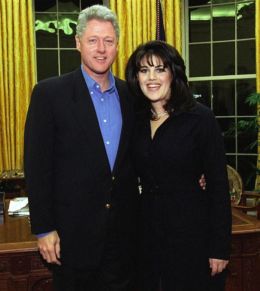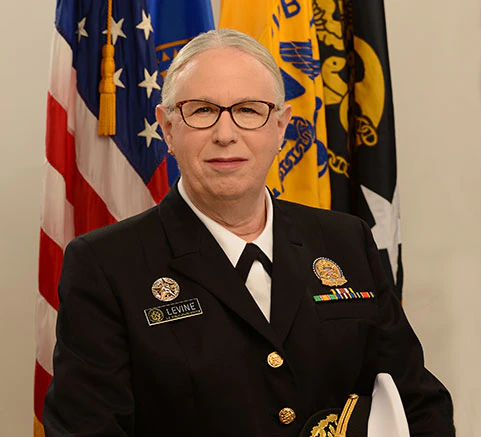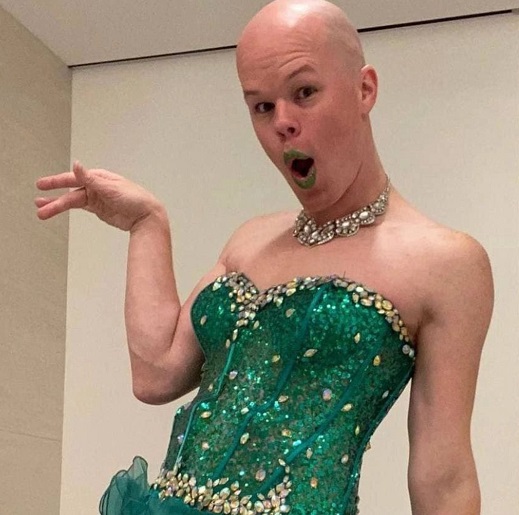Anatomy of a Liar
Posted By Stephen Paul Foster On In North American New Right | Comments DisabledI did not have sexual relations with that woman [2]. — President Bill Clinton
Nicholas R. Jeelvy’s recent Counter-Currents post, “The Elite Are Those Who Refuse to Lie [3],” got me to meditating about lying and liars.
From the “Good Book”:
These six things doth the Lord hate: yea, seven are an abomination unto him: a proud look, a lying tongue, and hands that shed innocent blood; a heart that deviseth wicked imaginations, feet that be swift in running to mischief; a false witness that speaketh lies, and he that soweth discord among brethren. — Proverbs 6: 19-19
Think about it for a moment: What the Lord doth hate reads like a generic job description for the abomination that is the upper echelons of our “proud-look” ruling class. All that’s missing is “other duties as assigned.”
Lying is the grease that lubricates the gears of the managerial state, a Big Brother devoted to the shedding of “innocent blood” (Iraq, Serbia, Afghanistan, Ukraine . . .) devising “wicked imaginations” (“white privilege,” “reparations,” “diversity is our strength”) and sowing “discord among brethren” (60 years of affirmative action, open borders).
Truth for the ruling class is an enemy. As dissidents on the Right, we, above all, regard ourselves as truth-tellers, which makes us the enemy. Being “the enemy” exposes us to the calumny, vituperation, and hatred — the ultimate psychological projection — of Big Brother.
Telling the truth and being honest is and has always been the bedrock of human decency and goodness. No one can ever be good without being honest. A dishonest person cannot ever hope or genuinely claim to be decent. Dishonest people — no matter how talented, intelligent, high-minded, or greatly intentioned they may otherwise be — corrupt themselves, soil their surroundings, and ruin the lives of people close to them, and often beyond. When dishonest people control collective enterprises, disaster unfolds. The normalization of pathology and indecency becomes routine.
Lies tear open holes in human relationships into which burrow copious forms of malignancy and perversity. Lies destroy the good things that take long, serious effort to build such as friendship, trust, cooperation, and affection. Lies harden the hearts of the deceived and turn any willingness to forgive into grudging suspicion and implacable resentment. Liars are reluctantly, if at all, forgiven because any confession or apology itself must fall under suspicion as a lie or a pose. A plea of “I am sorry” from a habitual liar elicits from the petitioned rejection or cynicism, not forgiveness. Marital infidelity, a crooked business deal, the betrayal of a promise – with each, someone looks into the eyes of someone else who trusts them, then lies.
 [6]
[6]You can buy Stephen Paul Foster’s novel Toward the Bad I Kept on Turning here. [7]
Truth remains forever intrinsically superior to falsity,[1] [8] a fact the underlying reality of which gives the formation and telling of the lie a paradoxical twist. The liar wants and needs to be taken as a truth-teller. The official Soviet news organ for seven decades consistently lied and distorted about nearly everything the government did. It was called Pravda, the Russian word for “truth.” “All the News That’s Fit to Print” has been the famous slogan of America’s Pravda, the New York Times, since 1896 and is a mockery of the debased state American journalism.
The lie succeeds only if it evades its essence and fronts itself as the truth. To be successful — that is, to be believed — a liar must be perceived to be the opposite of what he truly is. Yet, the liar cannot help but fear and shun the truth. He inevitably comes to loathe the truth-teller for being what he himself can never become, and thus will resort to the self-righteous indignation, defamation, and vituperation that are his stock-in-trade. The truth-teller becomes the object of fear and resentment because he threatens to expose and undo the liar. Since no one believes a liar, he, knowing what exposure means to him, harbors malice toward truth-tellers — those he willfully impersonates, but those whose ranks he can never join. The Left’s long history of defamation and hatred likewise comes from its lying and the liar’s natural fear and loathing for the truth-teller.
Like everyone, however, the liar deeply resents being lied to — another indication, ironically laden, that truth remains inherently superior to falsity. The liar will always demand the truth from others, but reserve for himself the advantages and flexibilities of deceit. “Liars share with those they deceive the desire not to be deceived.”[2] [9] The liar himself will never cease to employ the opprobrium “liar,” even though he is one himself.
Lying is also a host for other parasitic vices. To a lying disposition, many other character defects, failings, and corruptions attach themselves and feed off of it: cowardice, envy, greed, opportunism, and arrogance. Lies advance the schemes of cheaters and smooth the way for the vengeful, the fakers, and the shirkers of responsibility to have their way and evade detection and condemnation. Lies are essential to the success of collusion, bribery, political corruption, and tyranny. They are the indispensable tools of criminals used to set up their victims and shield their deviance from scrutiny. The child-seducer, the con artist, the fraudster, the swindler, the bribe-taker, the perjurer — all resort to lies in order to achieve their ends, gratify gross impulses, trample, defile, steal, and ultimately to escape detection and rightful punishment. Lying is also closely linked with fanaticism, because the fanatic subordinates everything, including a regard for facts and truth, to the advancement of his cause.
Everyone lies sometimes. Most people, I believe, lie sparingly, reluctantly, with embarrassment, with fear of detection — and most are probably poor at it. Physiology, the blush, makes it especially hard for some. “Good lying” usually requires practice, although like many other human activities, some people are naturally better at it than others. Some even seem to be born liars.
While everyone has likely lied at some point, not everyone is a liar, however. Some lies are benign. Some are even kind. Some are necessary. A liar, however, is a different sort of creature: someone who has lying embedded firmly and deeply in his character. The confirmed, artful liar achieves his success and builds his life around lying. He cannot breathe without routinely mangling and twisting the truth. I have met and observed people like this, some in very high places. They are often intelligent, charming, and even charismatic, but virtually everything they say in some way effaces the truth, distorts reality, and deceives.
Liars achieve success — that is, the lies they tell are taken to be true, and they are perceived as truth-tellers because most people operate on a daily routine with the assumption and trust that those around them are in fact truth-tellers. Thus, one grimly contemplates and rues the opportunism and predation of the liar who takes full advantage of others’ natural trust of others. All successful liars are in a sense “confidence men,” individuals who prevail in deceit because they usurp others’ good faith and turn it into a lamentable defect or lapses of judgment. The so-called Fourth Estate, in its tergiversation from a guardian to a state propaganda arm, has been an ongoing betrayal of the trust and good faith of the American people.
The real liar lies reflexively, but with skill and audacity. He performs with ease, confidence, and at times evinces a self-righteous indignation to help sell his evasions and deflect scrutiny. Successful lying and the confidence that arises from it breed arrogance — that “proud look” — and so sometimes the liar lies even when he does not need to: from habit, for practice, or just for fun. The career of the accomplished liar often follows a trajectory of increasingly ambitious mendacity fueled by his growing confidence in his lying skills, his imagined superiority, and his disdain for those dupes who believe him. In contemplating such an individual over time, one can observe a mounting arrogance, personal recklessness, and contempt for the boundaries of conduct that are enforced by probity and integrity among most people.
When liars face exposure for what they are, however, they often become emotional. Sometimes they go on the offensive. They fume with a feigned indignant posture. They accuse and malign those who have exposed them with more lying.
The liar’s exposure is two-layered: the fact that he lied, and the lie itself. To watch a liar exposed is a singularly pathetic and revolting experience. “What difference does it make now [11]?” The character of the exposed liar, once it is opened for inspection, often reveals itself in its ruptured, conflicted state as he attempts to both deflect and bear responsibility at the same time. One then may likely hear “I made mistakes” — a complete and deliberate perversion of the term, continuing even in confession the liar’s resolute dishonesty with his evasion of responsibility. Lies are released intentionally, while mistakes may be due to a myriad of factors such as carelessness, misperception, poor ability, or lack of competence. Or, “mistakes were made” — the resort to the passive voice and the implicit denial of an intentional agent. One rarely hears a direct confession to a lie — “I lied about that,” or “I was a liar,” or even less likely, “I am a liar.” You will never hear this from anyone. It seems easier for someone to admit to almost anything else, or confess to any other defect — “I cheated on my wife,” “I stole the money,” “I am an alcoholic” — than to confess to being a liar.
Honesty is also the bedrock of institutional and organizational decency and integrity. Institutions and organizations that are led by liars [13] amplify and compound their leaders’ personal dishonesty, and stamp it upon their operations. A large part of organizational success depends upon mutual trust, both within the organization and in its external relationships. Lying breaks that down. Institutionalized lying pushes the institution into dysfunction, and sometimes into fatal pathologies. Institutional missions are eroded. The goals are compromised, and the achievements are tainted or fail to materialize altogether. The dishonesty leads to intrigue, and creates layers of mistrust and openings for opportunism. Cynicism abounds.
Not surprisingly, people who have been lied to turn bitter and mistrustful. When lying becomes routine and expected, the purest, rawest cynicism inevitably follows in its wake. Cynicism is indiscriminate revenge taken against liars, institutions, and practices that are immersed in lies. A spouse who has been lied to may not just give up on the deceitful mate, but may turn against the institution of marriage itself. The lying spouse has injured his mate and soiled the institution.
A cynic is one who has given up on the truth. He sees everyone as a liar, a fraud, or a dupe. The cynic, unlike the skeptic, is a believer, but can only bring himself to believe the worst of others. The dupe’s failure is one of excessive credulity, an eagerness to believe a lie, or a lack of critical judgment. The cynic’s failure is to give up on the possibilities of honesty and integrity, and to needlessly concede the entire expanse of humanity to the liar and his dupes.
When a society’s institutions are corrupted, when truth-tellers are defamed, or when the truth simply becomes the official propaganda pronouncement of the moment, eventually no one can trust anyone. Suspenseful anticipation of the next turn in the propaganda saps energy and exhausts resources. With massive, institutional lying, the power-brokers ultimately become increasingly repressive and reckless.
The Polish philosopher Leszek Kolakowski writes that in totalitarian societies, lying is a routine state function:
Versions [of truth] are released for the people from above and can be altered the very next day. There is no reliable criterion of truth apart from what is declared truth at any moment. Thus, the lie in fact becomes the truth, or at any rate the distinction between truth and lies, in the ordinary sense of these words, disappears. This is the great triumph of socialism in the sphere of knowledge: to the extent that it demolishes the notion of truth, it cannot be accused of lying.[3] [14]
Kolakowski [15] was a post-war witness to the Sovietization of his country and the envelopment of its people and institutions in a pervasive system of collective dishonesty. He was a brilliant young philosopher who was part of the academic establishment, but who was eventually unable to remain a part of a dishonest, fraudulent system. As an undaunted truth-teller, he was cast out of the Party and forced into exile.
Kolakowski, writing of twentieth-century Soviet rule, ended up describing twenty-first-century America as well. The Soviet Union was a vast empire built on lies. The American empire is run by liars. As Right-wing dissidents, in this time of complexity and uncertainty, how can we combat the perplexity that complicates our lives and causes anguish and despair? The first step is to refuse to believe what the regime’s spokesmen tell you is true. Always ask yourself: cui bono? Who benefits from you believing what they say?
Refusing to believe is an act of courage and independence. Don’t surrender to the social blackmail: “We won’t approve of you!” “Non-believers are not welcome here.” Remember: It is important not to be a fool. Fools are easy to manipulate. It takes effort not to be one.
Seek out people — wise people, smart people — you trust who are non-believers. Listen to what they say. Take comfort. They have taken that step before you, and will help point the way and give you confidence that you are in touch with the truth — and with reality.
* * *
Like all journals of dissident ideas, Counter-Currents depends on the support of readers like you. Help us compete with the censors of the Left and the violent accelerationists of the Right with a donation today. (The easiest way to help is with an e-check donation. All you need is your checkbook.)
For other ways to donate, click here [16].
Notes
[1] [17] See Sesselia Bok, Lying, Moral Choice in Public and Private Life (New York: Pantheon, New York, 1978), p. 50: “. . . before we begin to weigh the good and the bad aspects of a lie, the falsehood itself is negatively weighted; while such a negative weight may be overridden, it is there the outset.”
[2] [18] Bok, Lying, p. 23.
[3] [19] Quoted from Dmitri Volkogonov, Autopsy of an Empire: The Seven Leaders Who Built the Soviet Empire, Harold Sukman, editor and translator (New York, Free Press), p. 393.




